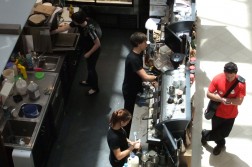A serious disease has re-appeared at Sydney University. Like tuberculosis, as soon as a cure is found and staff have been inoculated, a more virulent strain emerges. It has been labeled "hyper managerialism" and its symptoms are "efficiency in the name of inexplicable time wasting", "infinite make-work-form-filling" and "gobbledegook language to organise thinking". So far no test has been found which might identify early onset of the disease.
A similar outbreak at the Royal Melbourne Institute of Technology and at the ANU was reported by Adam Brereton in New Matilda concerning the application of the childishly named Behavioural Capability Framework to assess staff obedience and productivity. The strain of the disease causing anxiety at Sydney has generated academic fevers, disbelief at the intellectual poverty of the illness and associated mind boggling hypertension.
A brief case study of one patient’s debilitating experiences may be helpful.
Four weeks ago while attempting to appoint someone to a part time position in a Foundation which raises its own money and operates autonomously, I was startled by the arrival of forms labelled "permission to hire", "permission to appoint" plus requests for a job description completed many years ago. Those controls seemed laborious but the germs they carried were not immediately obvious.
Over the next few weeks at least 12 people were consulted, three quarters of them from an office called "resources for humans", the remainder from management with hyphenated titles who indicated that they were not responsible for the disease and had been isolated from it. I had contracted something dire.
In order to probe the mysteries of my condition, I became a self taught epidemiologist trying to separate the treatment from its cause. In this search, several individuals from the "resources for humans" office said in hushed voices that they were ashamed of their practices and that, although they washed their hands after receiving filled in forms, they had no alternative but to continue to ask for irrelevant information and to request numerous signatures to approve what was in the forms.
These innocents did ask "How can I help?", an offer which gave the suffering patient a ray of hope. Yet as novice nurses in a stifling system, as soon as responsibilities reached a more senior consultant, usually with a title such as "executive to the executive" or "assistant to the executive to the executive" the helpful noises were replaced by telephone calls neither answered nor returned and emails which disappeared into a bureaucratic black hole.
I was then persuaded that if the appointment of the proposed Foundation employee was to be made before winter arrives — several years ago such a transaction took no more than 10 minutes — the protocols would have to be followed, boxes ticked, questions answered and signatures of approval gathered. For internal and external contacts that might be made by the appointee, questions included "How often does this interaction occur with the main contact and for what purpose does this position interact with the main contact?"
When my pain became almost unbearable I identified the chief of the "resources for humans" office and phoned him in a fit of fever and consternation. I thought the disease was a form of constipation which desperately needed a laxative and inquired as to whether he could kindly apply it to any part of the management anatomy.
He returned my calls, was courteous and gave another ray of hope, "Perhaps this appointment need not have been included in our usual vetting, consulting, form filling, signature collecting system." At that point I also spoke with a senior academic whose colleagues were in bed, stricken with the disease. He advised that a laxative was relevant but not strong enough: "The whole system needs to be purged."
Almost four weeks into fevers and hypertension but with the form filling now aided by an "executive to an executive" who put the job description into neat sentences in separate boxes, subsequently followed by constructive expletives from me — "Jesus you must be joking" — the day came to collect signatures from four worthy individuals, one described as a "line manager" which seemed to have something to do with country dancing.
Some of these individuals knew little about the job or the activities of the Foundation but in order to maintain the symptoms of the disease — "create information for the sake of it" — the signatures had to be collected, scanned and sent to almost any administrative officer prepared to check them. One of the signatures referred to "Finance Officer" but no-one in resources for humans knew who this might be, so I volunteered to visit a bus shelter on Parramatta Road and collect the signatures of the lonely looking people who wait there. Most look as though no-one has ever asked them for their autographs so they could have found my request therapeutic. A helpful assistant to an assistant from resources for humans found this suggestion original but unacceptable.
On day three of the fourth week, with the disease at an acute stage, a laxative of some kind appeared to be having an effect. Motion was reported by a personal assistant to an executive director which in effect meant that the appointment could be made on the date requested and would be approved even if it had not been approved. I was enormously grateful for such imaginative discretion but then someone suggested my appointee would have to go before a "classifications committee", who would be making a classification, who might interpret the results and indicate whether complete health would ever be regained.
Into the fifth week of form-filling, signature-pursuing-trauma, the appointee received her letter of appointment but the offer was for a position for which she had not applied to be conducted in association with a person with whom she will not work. In vernacular parlance — let’s leave the medical model aside for a minute — this is a bureaucratic cock up. The resulting pathologist’s report said, "This looks like hyper managerialism — a form of inefficiency in the name of efficiency prompted by MBA type wisdom."
One hundred and fifty years ago, in Little Dorrit, the novelist Charles Dickens observed the same disease. It came, he said from the "Office of Circumlocution" whose purpose in the administration of government was to generate work which was of enormous significance because it would hinder or prevent other people from doing their jobs.
Like the epidemiologist which I have tried to become, Dickens wrote, "No public business of any kind could possibly be done at any time without the acquiescence of the Circumlocution Office. Its finger was in the largest public pie and the smallest public tart. It was equally impossible to do the plainest right and to undo the plainest wrong, without the express authority of the Circumlocution Office."
The source of the current disease cannot be sheeted home only to the department of resources for humans. This is only one feature of a culture of darkness and dampness which helps the growth of bureaucratically infectious fungi. Another part of the circumlocution culture is the university’s "Council for the Proliferation of Generals", whose website says it employs 31 people at least 26 of whom appear to be lawyers whose purpose seems to be to write rules to discourage dissent and to identify which big brother or sister should watch over people who don’t fill in forms and so limit any growth of ideas which might trespass beyond the boundaries of the official views of how a management efficient organisation would be run, or could be prevented from running.
Sorry I’m still infected with the disease, hence this strangled prose.
When a serious disease persists, the source needs to be identified and so too the personnel responsible for the persistence of infectious practices. In the case of universities intent on rule bound circumlocution, the chief managerialist must be held accountable. In a spirit of reconciliation I’m willing to have a look at his job description and the size of his remuneration. I could offer my signature but I don’t want to fill in any more forms.
Donate To New Matilda
New Matilda is a small, independent media outlet. We survive through reader contributions, and never losing a lawsuit. If you got something from this article, giving something back helps us to continue speaking truth to power. Every little bit counts.



